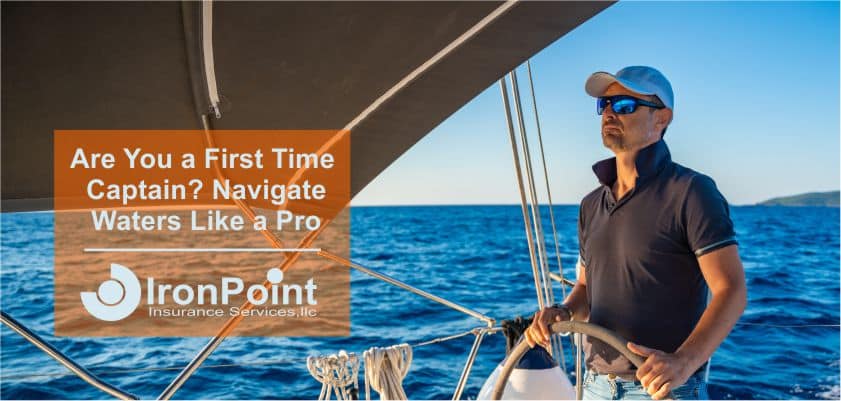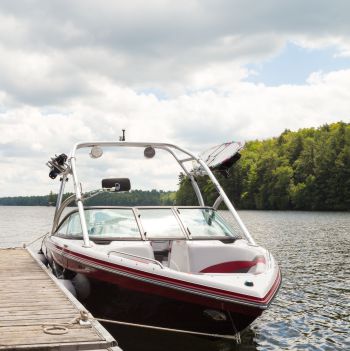Are You a First Time Captain? Navigate the Waters Like a Pro

Congratulations on joining the ranks of boat owners! So you’ve bought your first boat—congrats! As a first time captain, you’re stepping into a new world of adventure on the water. But before you drift off into daydreams of perfect sunsets and impromptu swimming stops, let’s talk reality: the learning curve for new captains can be as choppy as weekend waves at the marina.
The good news? You don’t have to learn every lesson the hard way. While there’s no substitute for experience, a little foreknowledge can prevent your maiden voyages from becoming legendary tales of “what not to do” at the yacht club.
Let’s chart a course through the five most common mistakes first time captains make—and how you can navigate around them with confidence.
1. Skipping the Pre-Launch Checklist
Picture this: You’ve arrived at the dock on a perfect Saturday morning. Your cooler is stocked, your passengers are excited, and you can practically feel the spray on your face already. In your enthusiasm, you might be tempted to untie those lines and hit the throttle.
Slow down, Captain.
First time captains often underestimate the importance of pre-departure checks. That “minor” issue you noticed last time but forgot about? It’s now a major problem ten miles from shore.
Create a comprehensive pre-launch checklist that includes:
- Fuel levels (with plenty of reserve)
- Oil and fluid checks
- Battery charge
- Navigation lights
- Horn or whistle
- Radio functionality
- Life jackets and safety equipment (one properly-sized PFD per passenger)
- Weather forecast review
Experienced captains aren’t embarrassed about working through a checklist—they know it’s what separates a pleasant day from an expensive learning experience.
The Float Plan: Your Missing Safety Net
One crucial safety measure often overlooked by first time captains is the humble float plan. It sounds formal, but it’s simply telling someone reliable where you’re going and when you’ll be back.
Your float plan should include:
- Names of all passengers onboard
- Description of your vessel (including registration numbers)
- Where you’re heading (with planned stops)
- Expected return time
- Communication devices you’ll have available
This isn’t busywork—it’s your rescue blueprint if something goes wrong. Think of it as the marine equivalent of telling someone which hiking trail you’re taking. Many boating apps now offer digital float plan options that make this process painless.
No one plans for emergencies. That’s why they’re called emergencies.
2. Misjudging Speed and Distance
Unlike cars, boats don’t have brakes. This fundamental difference trips up many first time captains when approaching docks, navigating narrow channels, or estimating stopping distances.
Momentum is everything on the water. That sleek vessel might promise exhilarating speed, but resist the urge to push the throttle too far too soon. A boat at high speed handles differently than at cruising speed, and stopping distances increase exponentially with velocity.
Learning how to dock a boat properly requires practice and patience. Start by mastering these fundamentals:
- Approach slowly—then go even slower
- Account for wind and current when maneuvering
- Practice the “neutral glide” technique for gentle approaches
- Understand how your propeller thrust and steering work together
- Learn to use reverse as your “brake”
Remember: No one’s impressed by a captain who races into the marina. They’re impressed by one who can dock smoothly on the first attempt without shouting or property damage.
The Passenger Effect
What many first time captains don’t realize is how dramatically passengers can affect handling. Unlike cars, where additional passengers barely change driving dynamics, boats respond differently based on weight distribution.
Teach your passengers basic boat etiquette:
- Stay seated while underway
- Don’t all rush to one side to see something
- Move deliberately rather than suddenly
- Understand basic commands you might need to give in emergencies
A well-briefed passenger is not just safer—they’re part of your crew rather than potential ballast problems.
3. Neglecting Weather and Navigation
That clear blue morning can transform into an afternoon thunderstorm faster than you can say “small craft advisory.” Being caught unprepared isn’t just uncomfortable—it can be dangerous, especially for a first time captain.
Weather on water is different from weather on land. Conditions that might be minor inconveniences in your backyard can create genuinely hazardous situations on the water. Learn to:
- Check multiple weather sources before departure
- Understand how to read radar patterns
- Recognize warning signs like sudden temperature drops or darkening cloud formations
- Know where your nearest safe harbors are located
- Have a clear “turn around” threshold before you leave the dock
The most experienced captains aren’t the ones who brave storms—they’re the ones who avoid them altogether by respecting Mother Nature’s power and unpredictability.
Navigation Beyond GPS
Your smartphone’s GPS is wonderfully convenient—until it isn’t. Battery failure, signal loss, water damage, or glare can render your digital navigator useless, often when you need it most.
Every first time captain should learn these essential skills:
- How to read a nautical chart
- The meaning of different buoy colors and shapes
- Basic compass navigation
- How to identify landmarks for positioning
- The rules of the waterway “road”
That red and green marker system isn’t decorative—it’s keeping you in safe waters. “Red, right, returning” isn’t just a catchy phrase; it’s the rule that keeps you in the channel when heading to port (keeping red markers on your right).
Take time to understand right-of-way rules and horn signals. The water has its own traffic laws, and ignorance isn’t just embarrassing—it’s dangerous.
4. Overestimating Your Boat’s Capacity
“We can fit one more person!” “Just bring another cooler!” “The dog barely counts!”
Such enthusiastic declarations have preceded many a low-riding, sluggish boat journey. Every vessel has weight limits established by engineers who understand physics better than your desire to bring along the entire neighborhood.
Overloading affects more than comfort—it impacts handling, fuel efficiency, and safety. A boat riding too low has reduced freeboard (the distance between the water and the top edge of the hull), making it more susceptible to taking on water in choppy conditions.
As a first time captain, remember:
- Know your boat’s maximum capacity (persons and weight)
- Account for gear, coolers, and equipment in your calculations
- Distribute weight evenly throughout the vessel
- Consider special precautions when boating with children or pets
- When in doubt, make two trips rather than one overloaded journey
The Gear Trap
It’s remarkable how quickly “essentials” multiply. What starts as basic safety equipment evolves into watersports gear, fishing equipment, extra coolers, portable speakers, and enough snacks to survive a minor apocalypse.
Be ruthless about what truly belongs on your vessel. Ask yourself:
- Is this necessary for safety?
- Does it enhance the core experience we’re seeking?
- Is it worth the space and weight trade-off?
- Would we be fine without it?
Sometimes the best boating experiences come with the least equipment. Simplicity creates space for the freedom that likely drew you to boating in the first place.
5. Underestimating Insurance Needs
The open water presents unique risks that many first time captains fail to consider until it’s too late. That homeowner’s policy you’re counting on? It likely provides minimal (if any) coverage for your boat, especially once you’re away from the dock.
Dedicated boat insurance isn’t just a document—it’s peace of mind for when adventures don’t go according to plan. Without it, a minor mishap can become a major financial setback.
Many new boat owners ask themselves, “Do I need boat insurance?” The answer is almost always yes—even if it’s not legally required in your state. The investment protects not just your vessel, but your financial future as well.
Comprehensive Coverage Matters
A smart first time captain understands that proper protection goes beyond just the hull and motor. The right boat insurance coverage options should address:
- Liability for injuries to others
- Environmental damage from fuel spills
- Uninsured boater protection (think: uninsured motorist coverage for boats)
- Personal effects coverage for electronics, fishing gear, and other belongings
- Medical payments for you and your passengers
- Salvage coverage for recovery operations
- On-water towing assistance
- Coverage for fishing equipment and watersports gear
- Consequential damage protection for issues like rot following a covered claim
The right policy doesn’t just repair your boat after a collision—it comprehensively protects your investment and liability. Before heading out, understand your coverage limits, deductibles, navigational restrictions, and seasonal considerations that might affect your protection.
From First Time Captain to Seasoned Skipper
The journey from rookie to respected captain isn’t about avoiding every mistake—it’s about making smaller, less expensive ones and learning quickly.
Take a boating safety course or get your California boater safety card before your first outing. You’ll learn essential rules and emergency procedures while potentially qualifying for insurance discounts—a win-win for safety and savings.
Find a mentor who knows your local waters. Their knowledge about hidden hazards and weather patterns is invaluable and can’t be found in any manual.
What truly separates a first-time captain from a seasoned skipper isn’t just hours on the water—it’s the right attitude. The humility to prepare thoroughly. The wisdom to turn back when conditions deteriorate. The patience to master fundamentals before attempting challenges.
Welcome to one of life’s greatest adventures. The water is waiting, First Time Captain.

Get a Boat Insurance Quote
Let us compare boat insurance quotes for you. We make it fast, safe, and secure.
- Let’s Get Started!
-
Have an Agent Call
- Compare Business Quotes
-
Business Owners’ Policy
-
Workers’ Compensation
-
General Liability
-
Commercial Auto
-
Cyber Liability
- Personal Insurance
-
Auto
-
Home / Condo / Renters
-
Motorcycle
-
Classic Car
-
Boat / Yacht
- Quote & Buy Online
-
Small Business Insurance
-
Mexico Auto Insurance
-
Pet Insurance
Call 1-877-334-7646 to speak with an insurance specialist.
Key Takeaways:
- Preparation prevents problems: always run a pre-launch checklist and file a float plan before heading out.
- Respect the learning curve: understand navigation, weather, and weight limits—boating isn’t like driving a car.
- Protect your investment: dedicated boat insurance covers risks your homeowner’s policy won’t touch.